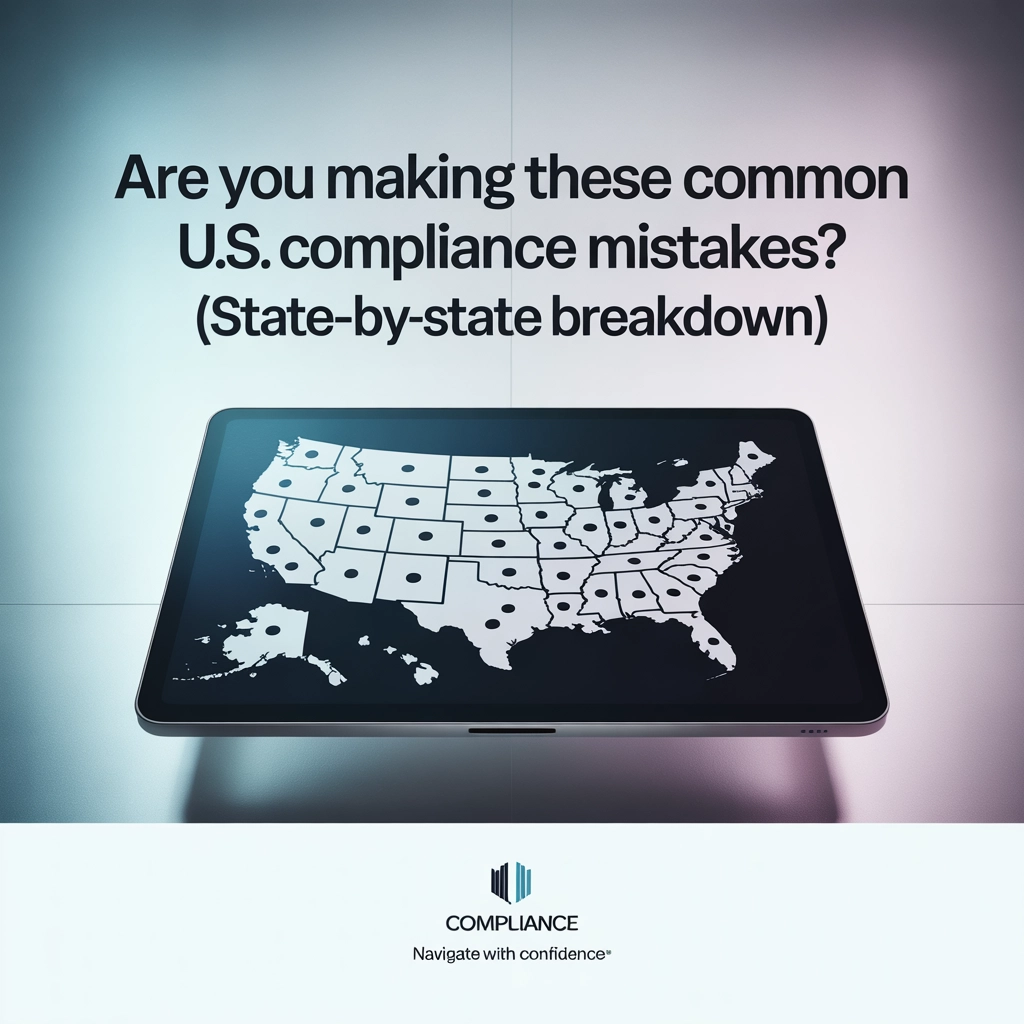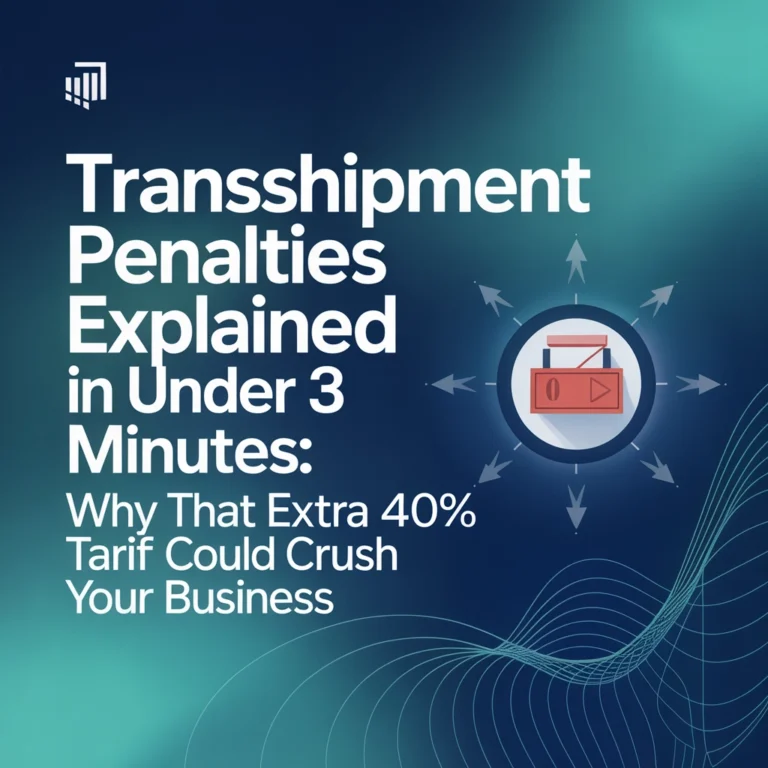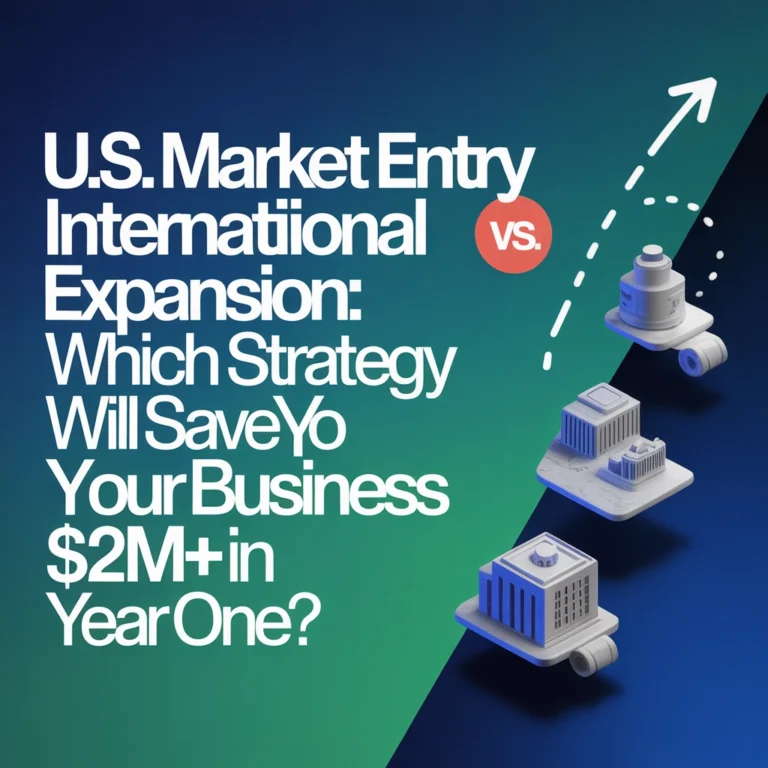Are You Making These Common U.S. Compliance Mistakes? (State-by-State Breakdown)

Launching a business in the U.S. is exciting – until compliance issues hit you like a freight train! Whether you're expanding from overseas or starting fresh domestically, navigating the maze of federal, state, and local regulations can make or break your venture. The scary truth? Most businesses are making the same preventable mistakes that cost millions in fines, lawsuits, and lost opportunities.
Here's the good news: you don't have to be one of them. Let's dive into the most common compliance traps that catch businesses off guard, and more importantly, how to avoid them before they crush your dreams.
The Foundation Fumbles: Entity Formation Gone Wrong
Picture this: you're so excited about your brilliant business idea that you rush to market without properly setting up your legal structure. Big mistake! This is where 70% of new businesses stumble right out of the gate.
Missing Registration Deadlines is the classic rookie error. Every state has specific deadlines for LLC or corporation registration, and missing them doesn't just mean paperwork headaches – it can completely derail your legal protection and tax benefits. In Delaware, for instance, missing the March 1st deadline for annual reports results in a $125 penalty that grows quickly.
Wrong Entity Type Selection happens when businesses choose their structure based on what "sounds cool" rather than what makes legal and financial sense. A tech startup choosing an LLC in California faces different tax implications than the same business structured as a C-Corp. State laws vary dramatically – what works in Nevada might be a disaster in New York.

Licensing and Permit Oversights multiply when you operate across state lines. Each state, county, and city can have different requirements for your industry. A food business needs health department permits, liquor licenses (if applicable), signage permits, and more – and these requirements change dramatically from Texas to Maine to California.
Employment Law Landmines: Where Good Intentions Go Bad
Employment compliance is where businesses get hit the hardest, especially when operating in multiple states. The complexity is mind-boggling – what's legal in Florida might get you sued in California.
The ADA Awareness Gap topped the list of employment mistakes in 2024. Too many businesses wait until they face a lawsuit to understand their Americans with Disabilities Act obligations. The problem? ADA requirements vary in interpretation and enforcement across different federal circuits, creating a patchwork of compliance challenges.
Pregnant Workers Fairness Act Confusion has caught countless employers off guard since its implementation. The Act requires reasonable accommodations for pregnancy-related conditions, but state laws add additional layers of complexity. New York's broader pregnancy accommodation requirements differ significantly from federal minimums, leaving multi-state employers scrambling.
Wage and Hour Violations remain the most expensive compliance mistake. California's strict overtime laws, meal break requirements, and classification rules are notoriously complex. Meanwhile, states like Texas follow federal minimums more closely. A business with locations in both states needs completely different payroll procedures.

Remote Work Policy Failures have exploded since 2020. When your California-based employee moves to Texas but keeps working remotely, which state's laws apply? Most businesses don't have clear policies addressing this, creating massive liability exposure.
Data Protection: The New Wild West
With 90% of Americans concerned about data privacy, compliance here isn't optional – it's survival. The challenge? There's no unified federal data protection law, creating a state-by-state compliance nightmare.
California's CCPA/CPRA Leadership sets the gold standard, but compliance costs are steep. Businesses processing personal information of California residents must provide detailed privacy notices, honor deletion requests, and avoid discriminating against consumers who exercise privacy rights.
Virginia's VCDPA and Other State Laws are creating a complex web of overlapping requirements. Connecticut, Colorado, and Utah have each passed their own versions, with more states following. Each has different thresholds, requirements, and penalties.

Cloud Security Failures increased 75% in 2024, with many businesses assuming their cloud providers handle all compliance requirements. Wrong! Most cloud contracts explicitly place compliance responsibility on the customer, not the provider.
Employee Training Gaps in data handling create the biggest vulnerabilities. A single employee mistake in data processing can trigger massive fines under multiple state privacy laws simultaneously.
Financial Compliance: Where Small Mistakes Cost Big
Financial compliance mistakes often stay hidden until an audit, investigation, or funding round exposes them. By then, the damage can be irreversible.
Sales Tax Nexus Confusion is the #1 financial compliance trap for growing businesses. Thanks to the Supreme Court's South Dakota v. Wayfair decision, economic nexus rules vary by state. Selling $100,000 of products to Texas customers might trigger Texas sales tax obligations, even if you've never set foot in the state.
Multi-State Income Tax Issues blindside businesses expanding across state lines. Having employees, contractors, or significant sales in a state can trigger income tax filing requirements. Some states are more aggressive than others – California and New York are notorious for broad tax reach.

Record-Keeping Disasters compound every other compliance problem. Different states require different retention periods for various documents. Employment records might need to be kept for 3 years federally but 4 years in some states. Tax records, contracts, and operational documents all have different requirements.
Bank Secrecy Act (BSA) Oversights catch businesses off guard when they hit certain transaction thresholds. Cash transactions over $10,000 must be reported, but many businesses don't realize this applies to money orders, cashier's checks, and other instruments too.
The Ongoing Compliance Challenge
Here's what separates successful businesses from compliance disasters: understanding that compliance isn't a one-time setup – it's an ongoing commitment that evolves constantly.
Regulatory Change Management requires dedicated attention. Federal agencies, state governments, and local authorities constantly update requirements. The businesses that thrive build systems to track these changes across all their operating jurisdictions.
Industry-Specific Complications multiply for certain sectors. Healthcare businesses must navigate HIPAA, state medical privacy laws, and licensing requirements that vary dramatically by state. Financial services face federal banking regulations plus state-specific requirements that can conflict.
Cross-Border Complexity affects international businesses entering the U.S. market. Immigration compliance, international trade regulations, and foreign business entity requirements create additional layers of complexity on top of standard U.S. compliance requirements.
Your Action Plan: Turning Compliance Into Competitive Advantage
Smart businesses flip the compliance script – instead of seeing it as a burden, they use superior compliance as a competitive differentiator. Customers, partners, and investors all prefer working with businesses that have their compliance house in order.
Start with a Compliance Audit across all your operating states. Document current gaps, prioritize by risk level, and create a remediation timeline. Invest in Expert Guidance – the cost of professional help is always less than the cost of getting it wrong. Build Compliance Systems that can scale as you grow into new states and markets.
Create a Compliance Calendar tracking renewal dates, filing deadlines, and regulatory update schedules for each jurisdiction where you operate. Train Your Team on compliance requirements relevant to their roles, and update training regularly as laws change.
The U.S. market offers incredible opportunities, but only for businesses that take compliance seriously. Don't let preventable mistakes derail your success story. With proper planning and expert guidance, compliance becomes your competitive advantage rather than your biggest headache.
Ready to get your compliance foundation rock-solid? USLaunch specializes in helping businesses navigate the complex U.S. regulatory landscape safely and efficiently.






